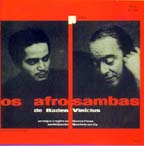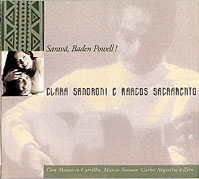Immortal Afro-Sambas
Clara Sandroni & Marcos Sacramento’s
take on the classic suite.16 November 2002
Baden PowellWhen talking of the Afro-Sambas of Baden Powell and Vinicius de Moraes, I use the word ‘suite’ advisedly. Are they, in fact, a suite or even a cycle? Four albums have been recorded with this repertoire, including two by Baden Powell himself, and in no two discs are the songs arranged in the same order, nor is the song list identical.
Accounts of the history and the components of this legendary body of songs are both fuzzy and contradictory. Ruy Castro claims that all the Afro-Sambas were composed in 1962 and ’63—before Baden had ever set foot in Bahia—and that the creation took place during a three-month alcoholic binge in Vinicius’ apartment and later in the Rio clinic where he checked himself in for drying out.
In another camp, Paulo Bellinati, Ricardo Cravo Albin’s Dicionário da MPB, and the Enciclopédia Musical Brasileira maintain that the Afro-Sambas were born after Baden’s visit to Bahia. And then there are Jairo Severiano and Zuza Homem de Mello, who quote Elis Regina’s recollection that the lyrics of “Canto de Ossanha” were completed during rehearsal for her mid-’60s TV show O Fino da Bossa.
According to Tárik de Souza, the Afro-Sambas are the eight songs recorded by the authors with Quarteto em Cy in 1966—“Canto de Ossanha,” “Canto de Xangô,” “Bocochê,” “Canto de Iemanjá,” “Tempo de Amor,” “Canto do Caboclo Pedra Preta,” “Tristeza e Solidão,” and “Lamento de Exu”—plus three more: “Berimbau,” “Samba da Benção,” and “"Consolação.”
The Enciclopédia Musical Brasileira and several other sources mention yet another Afro-Samba, “Samba de Oxóssi,” which appears never to have been recorded unless under a different title. “Samba em Prelúdio,” “Formosa,” and “Apelo” have also been cited here and there as being part of the cycle.
Baden himelf must have had a rather fluid vision of what constitutes an Afro-Samba, for he included “Labareda” and variations on “Berimbau” in his 1990 remake album with Quarteto em Cy. In the Afro-Sambas CD Bellinati recorded in 1995 with Mônica Salmaso—a disc that purports to contain all the Afro-Sambas—the guitarist/arranger added not only “Labareda” and “Berimbau” but also “Consolação.” By way of an extra tribute, Bellinati incorporated his own “Cordão de Ouro” in a medley with “Berimbau” to honor Besouro Mangangá, aka Cordão de Ouro, the legendary Bahian capoeirista also honored by Baden in “Lapinha.”
Complicating the matter even further is the frequent ascribing of Baden’s inspiration to an orientation from Vinicius, who played him an LP of sambas de roda and pontos de macumba recorded in Bahian terreiros. How does that sit vis-a-vis this quotation, attributed to Vinicius himself?:
Before “Berimbau” and “Samba da Bênção,” Baden had already chosen me to write “Canto do Caboclo Pedra Preta.” That song was composed “right there and then”—that is, music and lyrics for the second part searching for a meaning for the original caboclo’s chant. From that same period is “Canto de Yemanjá,” in which—it is my opinion—Baden reached a beauty rarely attained. [...] Baden’s musical antennae to Bahia and, in a final stretch, to Africa, allowed him to put together this new syncretism, adding a “carioca” taste, within the spirit of modern samba, to the Afro-Brazilian candomblé, giving it a more universal dimension.
Clara SandroniPerhaps it’s just as well that Clara Sandroni and Marcos Sacramento did not title their new disc Afro-Sambas. In naming it Saravá, Baden Powell! they allude to the nature of the songs without confusing the matter even further. Their version includes all the songs of the 1966 album minus the lyric-less “Lamento de Exu.” Like Baden and Bellinati, they added “Berimbau,” but chose to omit “Labareda.” Again like Bellinati, Sandroni and Sacramento included “Consolação.” And they’ve expanded the territory with “Formosa” and “Tem Dó”—Baden/Vinicius tunes that have never been part of the cycle but work very well within its framework—as well as two later songs from the Baden/Paulo Cesar Pinheiro partnership, “Lapinha” and “É de Lei.”
Marcos SacramentoThe release of Saravá, Baden Powell! is a good excuse for a marathon Afro-Sambas session. Listening to the four albums in succession reveals the vast differences in interpretation among them. The original disc, arranged and conducted by Guerra Peixe, is seminal and exuberant but also messy, threatening to collapse into pandemonium at any moment. In his 1990 recording, Baden instilled discipline and increased the guitar’s role. The only “real” singers in the first two albums were the backup vocalists, Quarteto em Cy.
Both of the newer discs feature professional vocalists and are highly accomplished on all technical counts. Mônica Salmaso and Paulo Bellinati’s voice/guitar production is a gossamer web, the song taken out of its African context and mounted on the pedestal of recital art. Saravá, Baden Powell!, on the other hand, hews closer to Baden’s concept, finding common ground between discipline and heritage, rhythm and high art.
Playing the guitar is Mauricio Carrilho, also responsible for the arrangements and musical direction in the studio. His presence gives Sacramento’s solos, “Formosa,” “Deixa,” and “Lapinha,” that welcome sound we haven’t heard since A Modernidade da Tradição. The accompaniment is suitably Africanized by means of the atabaques, agogô, djambe, ganzá, caixa, surdo, pandeiro, tamborim, and berimbau wielded by percussionists Carlos Negreiros, Marcos Suzano, and Zero.
Sandroni and Sacramento have been singing together for a long time. She made a guest appearance on his group Cão Sem Dono’s 1986 eponymous album. The pair began performing the Afro-Sambas in 1995 and have since honed their duo skills in four CDs with Lira Carioca. By now, their collaborations sound effortless, which is just the kind of sound Baden Powell would have wished for his Afro-Sambas.
Clara Sandroni & Marcos Sacramento: Saravá, Baden Powell!
(Biscoito Fino BF 523; 2002) 52:20 min.01. Bocoché (Baden Powell/Vinicius de Moraes)
02. Tem Dó (Baden Powell/Vinicius de Moraes)
03. Canto de Pedra Preta (Baden Powell/Vinicius de Moraes)
04. Tristeza e Solidão (Baden Powell/Vinicius de Moraes)
05. Formosa (Baden Powell/Vinicius de Moraes)
06. Tempo de Amor (Baden Powell/Vinicius de Moraes)
07. Canto de Iemanjá (Baden Powell/Vinicius de Moraes)
08. Canto de Ossanha (Baden Powell/Vinicius de Moraes)
09. Lapinha (Baden Powell/Paulo Cesar Pinheiro)
10. Berimbau (Baden Powell/Vinicius de Moraes)
11. Canto de Xangô (Baden Powell/Vinicius de Moraes)
12. Consolação (Baden Powell/Vinicius de Moraes)
13. É de Lei (Baden Powell/Paulo Cesar Pinheiro)
Copyright © 2002–2021 Daniella Thompson. All rights reserved.






